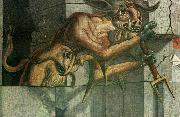
Oil On
Canvas, Real Flavor of Old Masters
|
Albrecht Durer
|
|||
|
|
|||
| b.May 21, 1471, Imperial Free City of Nernberg [Germany] d.April 6, 1528, Nernberg Albrecht Durer (May 21, 1471 ?C April 6, 1528) was a German painter, printmaker and theorist from Nuremberg. His still-famous works include the Apocalypse woodcuts, Knight, Death, and the Devil (1513), Saint Jerome in his Study (1514) and Melencolia I (1514), which has been the subject of extensive analysis and interpretation. His watercolours mark him as one of the first European landscape artists, while his ambitious woodcuts revolutionized the potential of that medium. D??rer introduction of classical motifs into Northern art, through his knowledge of Italian artists and German humanists, have secured his reputation as one of the most important figures of the Northern Renaissance. This is reinforced by his theoretical treatise which involve principles of mathematics, perspective and ideal proportions. His prints established his reputation across Europe when he was still in his twenties, and he has been conventionally regarded as the greatest artist of the Renaissance in Northern Europe ever since. | |||
|
|
|||
|
|
Christ in Limbo new16/Albrecht Durer-323939.jpg Painting ID:: 42433 Visit European Gallery |
mk168 392x280mm 1510 Woodcut | |
Height Width |
INS/CM |
||
|
X |
|
||
|
|
|||
|
PACHER, Michael
|
|||
|
|
|||
| Austrian Northern Renaissance Painter, ca.1430-1498 | |||
|
|
|||
|
|
Christ in Limbo new21/PACHER, Michael-432623.jpg Painting ID:: 63696 Visit European Gallery |
1460s Tempera on pine panel Museum of Fine Arts, Budapest Obviously, every action of the devil against Christ is hopeless and can do no harm. It is ludicrous to see him lean out from his castle at the risk of losing his balance; the fires of hell illuminate his backside with a reddish glow, while he gnashes his teeth mixed with fangs, brandishes his two-pronged fork, and makes a threatening gesture with the blunt, fleshy fingers of his other hand. His head is like that of a he-goat, on his arms there are prickles reminiscent of a bat's wings; the contours of a beak-like nose on his belly complete the phantom figure of horror created by the fantasy of the Middle Ages.Artist:PACHER, Friedrich Title: Christ in Limbo (detail) Painted in 1451-1500 , Austrian - - painting : religious | |
Height Width |
INS/CM |
||
|
X |
|
||
|
|
|||








